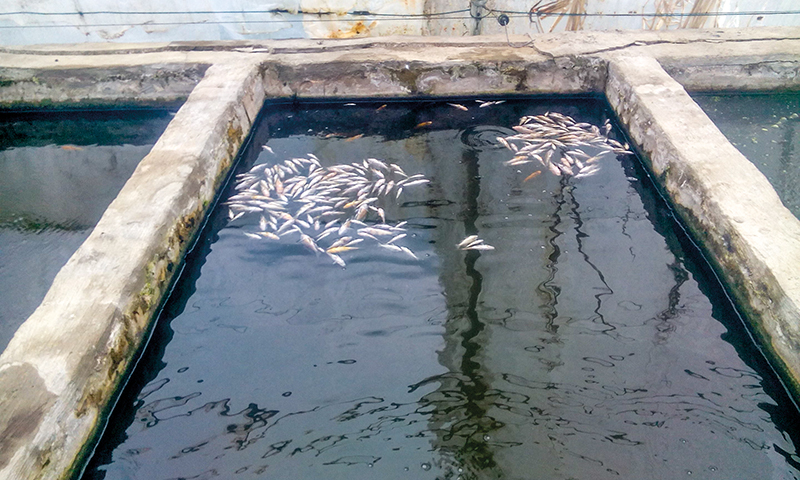
Fish farmer Nick James has appealed to the SPCA’s Farm Animal Protection Unit to intervene after he found thousands of rare fish dead in his facility this week. James believes the disaster is linked to Eskom loadshedding and says it has cost him close to R100 000 in loss of income.
James has four tunnels and three indoor hatcheries on a farm outside Makhanda (Grahamstown), where he breeds food-quality tilapia and Lake Malawi cichlids for sale to retailers and restaurants. He is the Tilapia Sector Representative in the Aquaculture Association of Southern Africa.
On Tuesday 4 December he woke up to find thousands of fish floating dead on the water’s surface.
The specialised breeding and rearing facility has a three-phase generator that starts and stops automatically when there is a power cut.
“It has three-phase and low-voltage protection,” James said, explaining the extensive defences in place to prevent such disasters and care for the well-being of the fish. “But sensing low voltage takes a few seconds before it switches off the Eskom supply, otherwise with Eskom’s variable voltage, it would be on-and-off hundreds of times a week.
“On Eskom start-up, we have two time delay units that mean different systems do not all start at the same time to prevent overload. However, if for several seconds on start-up, the Eskom voltage is so low, the pumps draw extra amperage and the trip switch will fail.”
Typically, a swimming pool pump draws about 4 amperes, James explained.
“On start-up it will draw 12 amps for a second or so. Decrease the voltage, and this goes up accordingly, tripping the switch that would normally protect the pump.”
The Lake Malawi fish are much more fragile and sensitive to low oxygen than the tilapia, James said.
“We lost about half the Malawi cichlids that were adult size and ready for sale. We lost one tank of small tilapia (about 4000 fish).
The fish take about a year to raise to that size and James estimates his loss of income as a result to be close to R100 000 – the Malawis R90 000 and the tilapia R7000.
“Not having certain species like the fragile Malawis means we lose market share, and therefore customers who will not come back,” James said. “The fish that died were the most rare, fragile , therefore expensive species. It will take another year to breed and replace these. By then the customers will have gone elsewhere.”
James believes the variable voltage caused by Eskom loadshedding is to blame for the equipment failure, and also links poor maintenance of infrastructure by the utility to a recent destructive fire in the area.
“It is notable that the Eskom line in our entire area was condemned for replacement in 2012 (it was built prior to 1989),” James said. “Nothing has happened and in August this year yet another wooden Eskom pole on their high voltage line fell over because it was rotten and started a fire that burnt much of Featherstone Kloof on the Grahamstown Southern Commonage and our boundary.
“Several times, on our own property and also in Featherstone Kloof, the high voltage lines have fallen off their glass insulators due to rotting of the binding. This results in high voltage lines at face level just above the ground. You can imagine what happens when people/livestock touch these lines.”
Eskom has not yet responded to Grocott’s Mail’s request sent on Thursday 6 December for comment.


